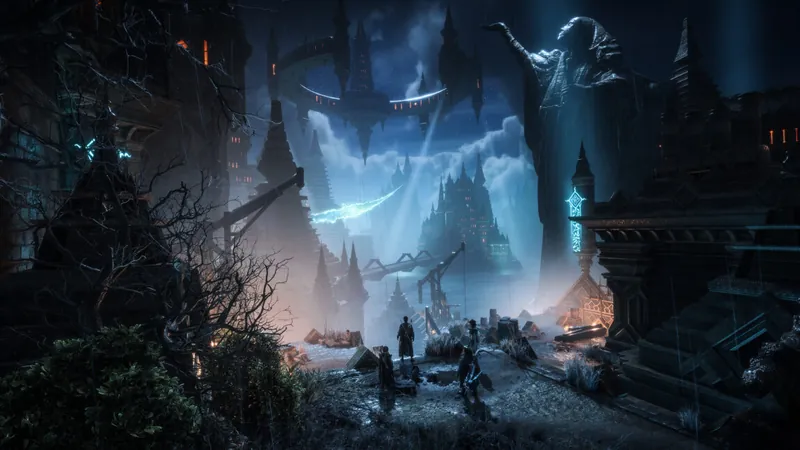
Dragon Age: The Veilguard - Are Your Choices Really Impactful Enough to Save the World?
2024-11-14
Author: Ken Lee
Introduction
BioWare, the renowned AAA game development studio, is known for its masterful world-building, intricate storytelling, and deep character development. The immersive universes they create allow players to dive into rich narratives filled with engaging content, supported by extensive in-game codices that enrich the lore and stimulate fan theories. Given this pedigree, it's no wonder that there’s an enthusiastic community of fans who actively generate fan fiction and artwork based on their beloved characters.
However, after the mixed receptions for Mass Effect: Andromeda and Anthem, BioWare’s recent return to familiar gameplay formulas in Dragon Age: The Veilguard has prompted some fans to question whether the emotional depth and ethical dilemmas that previously defined the series are still present. As I delve into this new installment, I've noticed a concerning lack of morally ambiguous quests that profoundly challenge players’ moral compasses.
The Interactive Dilemma
Before we dig deeper into the choices that The Veilguard offers, it is crucial to understand the limitations and potential of interactive media. Video games, especially RPGs, allow players to take control of their character's destiny in ways that novels can't replicate. The allure lies in the personal involvement; players don’t just witness the story unfold—they shape it. Yet, the medium is constrained by the developer's need for a coherent plot, often leading to an 'illusion of choice,' where players feel empowered but still follow a directed path.
A key factor in enhancing player agency is ensuring choices have real emotional stakes within the narrative. Instead of simply completing goals, players must feel that their decisions resonate with the overarching story—even if the outcomes fit within prescribed boundaries.
Who is Rook?
In The Veilguard, we embody a character named Rook, whose story interjects with the player’s choices through a lightly sketched backstory that ties back to the faction you select. Although players choose Rook’s first name, the broader narrative unfolds through the decisions they make during gameplay.
Early on, Rook's first major encounter features a town that mysteriously severed ties with the faction she’s aiding. As players investigate and confront the individual responsible for the ensuing chaos, they face pivotal choices that not only reflect their values but also define who Rook becomes. The decisions aren’t just mechanical; they demand players wrestle with ethical considerations about morality.
The challenge of deciding the fate of this antagonist reveals a deeper aspect of role-playing. Do you choose to let him suffer, mirroring your disgust for his actions, or uphold your principles by saving him despite the suffering he has caused? These moments define the player experience, yet many feel fleeting rather than impactful.
Consequences that Matter—But Don’t
Longtime followers of BioWare have enjoyed continuity where choices reverberate in future installments, often prompting their characters to encounter allies or adversaries shaped by past decisions. However, the consequences of those choices can become a slippery slope, resulting in a tangled web of plot points that are challenging, if not impossible, to manage over several games.
In The Veilguard, BioWare sidesteps the issue of 'quantum characters' (characters whose existence in the story varies based on player choices) by simply not referencing beloved characters from previous games—leaving many fans wishing they could see the legacy of choices past. This game focuses on providing players with a fresh story while respecting their individual gameplay experiences, maintaining a delicate balance between nostalgia and innovation.
Yet, some feel that this has led to bland decision-making moments without the weight they crave. For instance, throughout my first play of The Veilguard, despite navigating significant moments, many quests felt devoid of the tension that would normally accompany impactful choices. I found myself longing for the uncomfortable, visceral emotions that previous titles elicited when facing moral quandaries.
A Missing Element?
Interestingly, player reactions to choice-making mechanics have sparked discussions online. After uncovering that only a scant three choices from Dragon Age: Inquisition have been incorporated, many worry that the absence of meaningful decisions diminishes emotional investment. While certain gameplay moments remain thrilling, I often feel disconnected from the stakes that my choices allegedly hold. Rook’s team may have opinions about her decisions, but so far, those reactions do not drive the compelling narratives that players expect.
Even after seventy hours of gameplay and the satisfaction of heroic feats, I am still yearning for those sticky choices that test my moral compass. Have choices been artfully minimized in an effort to raise the stakes of larger conflicts? The evolution of these decisions remains unclear as I anticipate the next act—will BioWare finally reclaim the emotional substance that originally drew players into Thedas?
As the drama unfolds, one thing is for certain: players crave complexity, ethical dilemmas, and a chance to truly immerse themselves in the multiverse of Dragon Age. Will Rook's journey not only save the world but also offer an opportunity for genuine moral reckoning? Let’s hope the next act surprises us in ways we have longed for.


 Brasil (PT)
Brasil (PT)
 Canada (EN)
Canada (EN)
 Chile (ES)
Chile (ES)
 España (ES)
España (ES)
 France (FR)
France (FR)
 Hong Kong (EN)
Hong Kong (EN)
 Italia (IT)
Italia (IT)
 日本 (JA)
日本 (JA)
 Magyarország (HU)
Magyarország (HU)
 Norge (NO)
Norge (NO)
 Polska (PL)
Polska (PL)
 Schweiz (DE)
Schweiz (DE)
 Singapore (EN)
Singapore (EN)
 Sverige (SV)
Sverige (SV)
 Suomi (FI)
Suomi (FI)
 Türkiye (TR)
Türkiye (TR)